人教新课标 必修二 第二单元Olympic Games reading 课件(共25张PPT)
文档属性
| 名称 | 人教新课标 必修二 第二单元Olympic Games reading 课件(共25张PPT) |
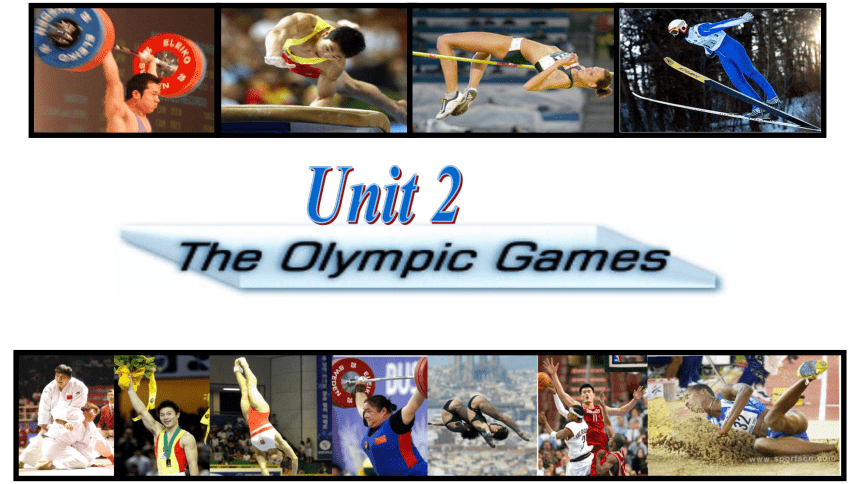
|
|
| 格式 | pptx | ||
| 文件大小 | 1.2MB | ||
| 资源类型 | 教案 | ||
| 版本资源 | 人教版(新课程标准) | ||
| 科目 | 英语 | ||
| 更新时间 | 2021-02-03 00:00:00 | ||
图片预览

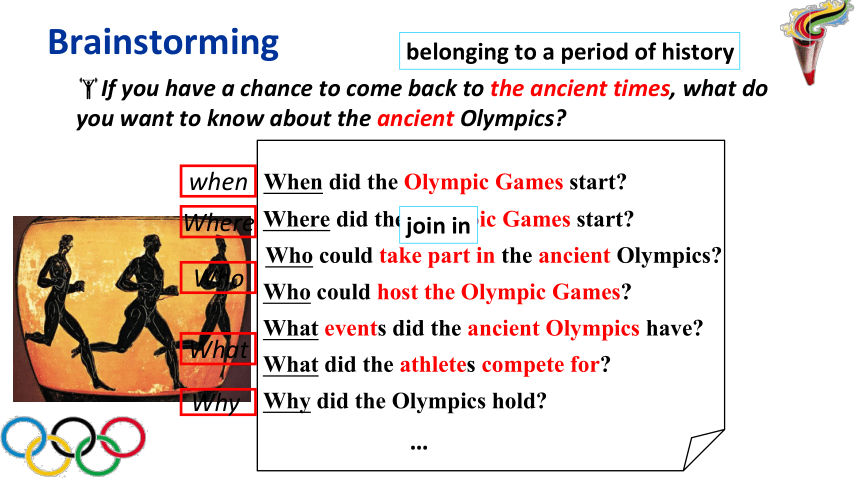
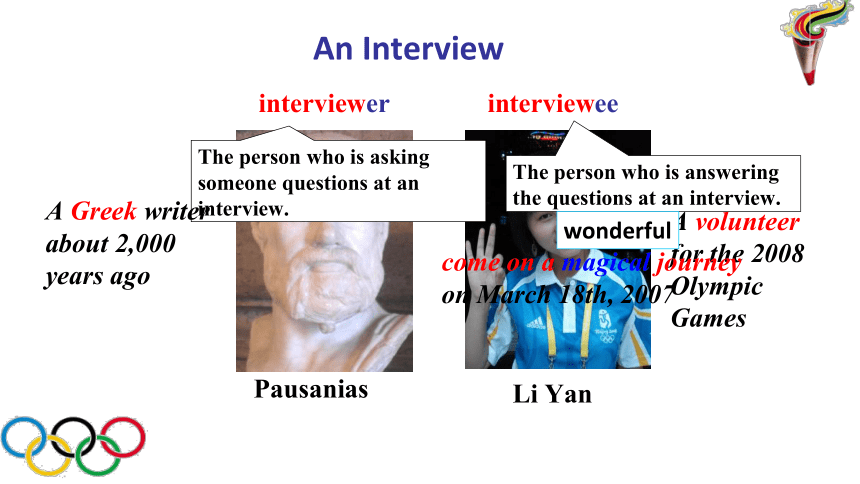
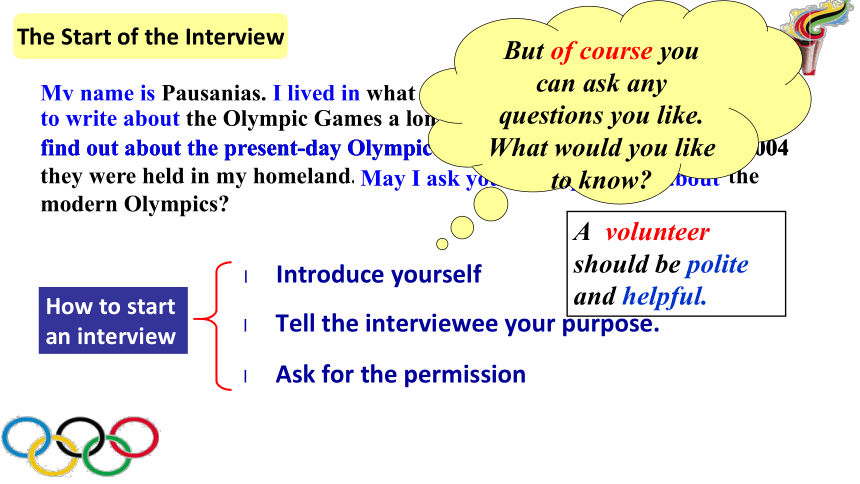
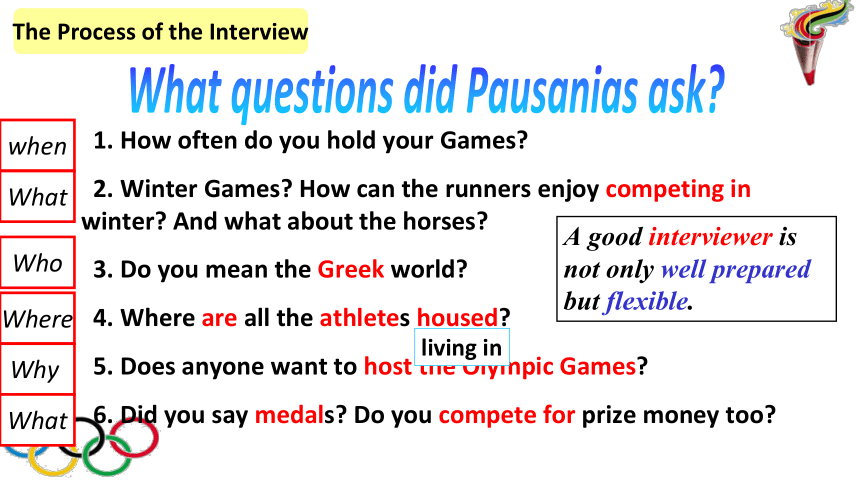
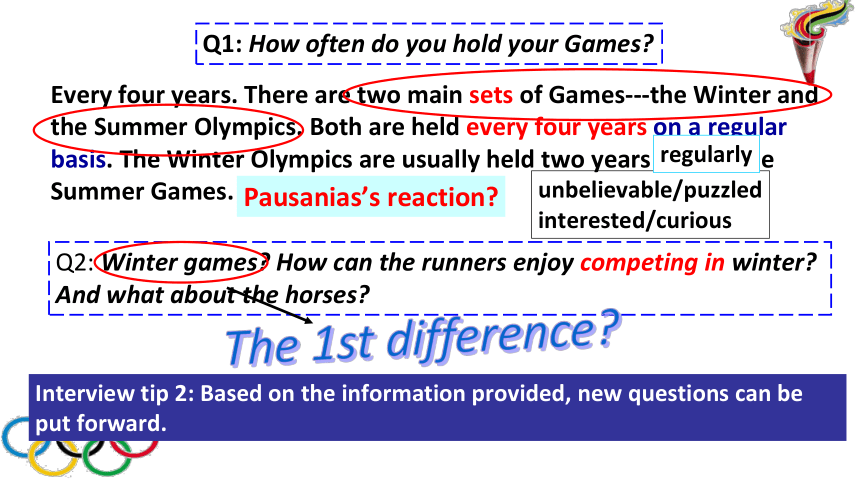
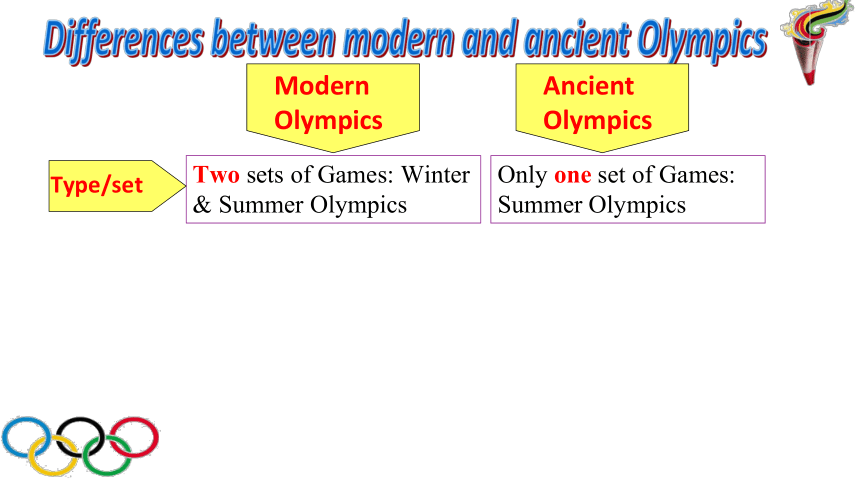
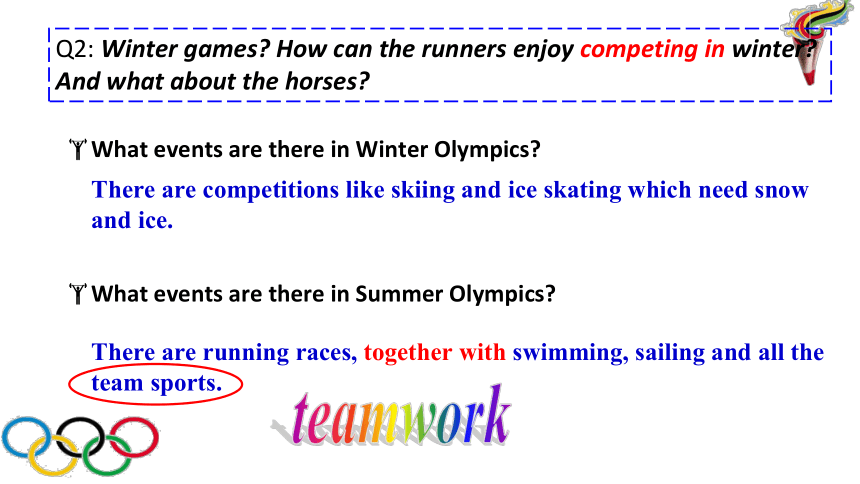
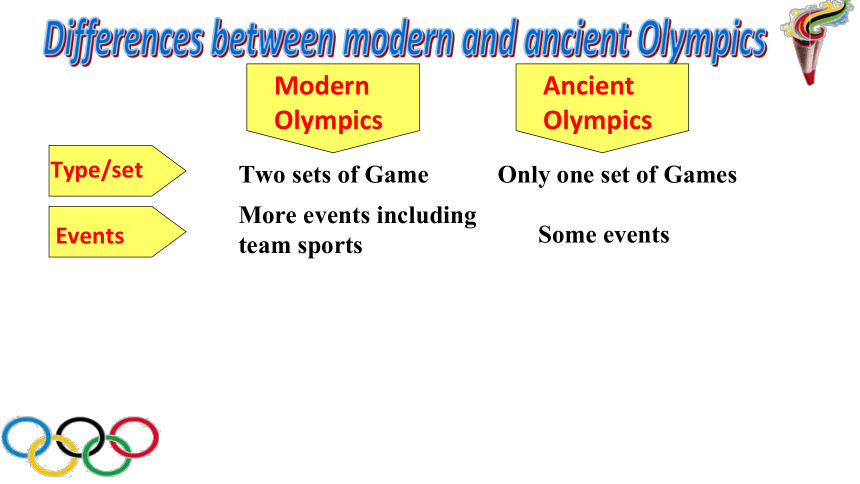
文档简介
Unit 2
If you have a chance to come back to the ancient times, what do you want to know about the ancient Olympics?
When did the Olympic Games start?
Where did the Olympic Games start?
Who could take part in the ancient Olympics?
Who could host the Olympic Games?
What events did the ancient Olympics have?
What did the athletes compete for?
Why did the Olympics hold?
…
Brainstorming
when
What
Who
Where
Why
join in
belonging to a period of history
An Interview
Pausanias
Li Yan
The person who is asking someone questions at an interview.
The person who is answering the questions at an interview.
interviewer
interviewee
A volunteer for the 2008 Olympic Games
A Greek writer about 2,000 years ago
come on a magical journey on March 18th, 2007
wonderful
My name is Pausanias. I lived in what you call “Ancient Greece” and I used to write about the Olympic Games a long time ago. I've come to your time to find out about the present-day Olympic Games because I know that in 2004 they were held in my homeland. May I ask you some questions about the modern Olympics?
Introduce yourself
Tell the interviewee your purpose.
How to start an interview
Ask for the permission
The Start of the Interview
My name is Pausanias. I lived in what you call “Ancient Greece” and I used
to write about the Olympic Games a long time ago.
find out about the present-day Olympic Games because I know that in 2004
I've come to your time to
May I ask you some questions about
But of course you can ask any questions you like. What would you like to know?
A volunteer should be polite and helpful.
The Process of the Interview
1. How often do you hold your Games?
2. Winter Games? How can the runners enjoy competing in winter? And what about the horses?
3. Do you mean the Greek world?
4. Where are all the athletes housed?
5. Does anyone want to host the Olympic Games?
6. Did you say medals? Do you compete for prize money too?
What questions did Pausanias ask?
when
What
Who
Where
Why
What
A good interviewer is not only well prepared but flexible.
living in
Every four years. There are two main sets of Games---the Winter and the Summer Olympics. Both are held every four years on a regular basis. The Winter Olympics are usually held two years before the Summer Games.
Q1: How often do you hold your Games?
Pausanias’s reaction?
Q2: Winter games? How can the runners enjoy competing in winter? And what about the horses?
unbelievable/puzzled
interested/curious
Interview tip 2: Based on the information provided, new questions can be put forward.
The 1st difference?
regularly
Differences between modern and ancient Olympics
Two sets of Games: Winter & Summer Olympics
Only one set of Games: Summer Olympics
Modern Olympics
Ancient Olympics
Type/set
There are running races, together with swimming, sailing and all the team sports.
Q2: Winter games? How can the runners enjoy competing in winter? And what about the horses?
What events are there in Winter Olympics?
What events are there in Summer Olympics?
There are competitions like skiing and ice skating which need snow and ice.
teamwork
Differences between modern and ancient Olympics
Two sets of Game
Only one set of Games
More events including team sports
Some events
Type/set
Events
Modern Olympics
Ancient Olympics
Why are there more and more events included in Olympics?
Thinking
Olympics stand for the sports for all and pay more attention to the teamwork and cooperation. Besides, more and more sports become popular among people all over the world.
Who will be admitted as competitors?
Only athletes who have reached the agreed standard for their event will be admitted as competitors. They may come from anywhere in the world.
What spirit of Olympics does this rule show?
Justice/ fairness
Q3: Do you mean the Greek world?
Thinking
be allowed to become a member
Q3: Do you mean the Greek world?
Because in ancient times, only Greek cities used to compete against each other just for the honour of winning.
No other countries could join in, nor could slaves or women!
Nowadays?
Any country can take part if their athletes are good enough.
Close communication
Women are not only allowed, but play a very important role in gymnastics, athletics, team sports and ...
Equality
There are no slaves.
Equality/ freedom
Improvement of human beings
Differences between modern and ancient Olympics
Two sets of Game
Only one set of Games
More events including team sports
Some events
Any athletes who have reached the agreed standard
Only men in the Greek world
Any country is possible
Greece
Pausanias’s reaction?
Type/set
Events
Athletes
Host
Modern Olympics
Ancient Olympics
Please wait a minute! All those events, all those countries and even women taking part! Where are all the athletes housed?
unbelievable/amazed/surprised
Q4. Where are all the athletes housed?
A main reception building
Several stadiums
A gymnasium
A special village:
That sounds very expensive. Does anyone want to host the Olympics?
Interview Tip 3: Repeat and confirm the key information of the interviewee.
As a matter of fact, every country wants the opportunity.
It’s a great responsibility but also a great honour to be chosen. There’s as much competition among countries to host the Olympics as to win Olympic medals.
Hosting the Olympics is a challenge to test the comprehensive strength (综合国力) of the host country and to be chosen also shows the ability and strength of the host country.
Why?
Do you think it is a good idea to host the Olympic Games? why?
Reasons to host the Olympics
A great responsibility
A great honour
National pride (自豪感)
Culture spread
New investments(投资)
New sport facilities(设施)
Tourism
Reasons not to host the Olympics
High cost
Much planning
Accidents/ attacks
Pressure/ stress
Extensive Thinking
Q6. So even the olive wreath has been replaced! Oh dear! Do you compete for prize money too?
In 2007 London have already started planning for the 2012 Olmpics.
There’s as much competition among countries to host the Olympics as to win Olympic medals.
Do the athletes in modern Olympics compete for prize money?
Run faster, jump higher, and throw further.
Process?
Result?
“The most important thing is not to win but to take part, and not to have conquered but to have fought well.”
Swifter, Higher and Stronger
Extensive Thinking
P: Well, that’s good news. How interesting! Thank you so much for your time.
Interview Tip 4: Be polite and express your thanks at last.
The End of the Interview
Differences between modern and ancient Olympics
Two sets of Game
Only one set of Games
More events including team sports
Some events
Any athletes who have reached the agreed standard
Only men in the Greek world
Any country is possible
Greece
Medals
The olive wreath
Modern Olympics
Type/set
Events
Athletes
Host
Award
Ancient Olympics
Similarities between modern and ancient Olympics
Both are held every ______________.
Some events are the same, such as____________________________.
Both are held not for money but for ______.
The mottos are the same. They are: ___________________________________.
running, jumping etc.
Swifter, Higher and Stronger
four years
honor
The spirit passes down
Now you have come on a magical journey in 708 BC to find out about the ancient Olympic Games.
A: a modern volunteer (interviewer) B: a Greek (interviewee)
Tips:
Introduce yourself, tell your purpose and ask for permission.
Based on the information provided, new questions will be put forward.
Repeat and confirm the key information of the interviewee.
Express your thanks at last.
Role-play
well prepared, flexible and friendly
polite, helpful and proud
The important thing in life is not the triumph but the struggle.
Please enjoy the process of your life!
Write a report on the interview.
Review the passage and memorize the important words and expressions.
Homework
Differences
Similarities
Type/set
Events
Athletes
Host
Award
Every four years
Some same events
Compete for honor
Swifter, higher and stronger
If you have a chance to come back to the ancient times, what do you want to know about the ancient Olympics?
When did the Olympic Games start?
Where did the Olympic Games start?
Who could take part in the ancient Olympics?
Who could host the Olympic Games?
What events did the ancient Olympics have?
What did the athletes compete for?
Why did the Olympics hold?
…
Brainstorming
when
What
Who
Where
Why
join in
belonging to a period of history
An Interview
Pausanias
Li Yan
The person who is asking someone questions at an interview.
The person who is answering the questions at an interview.
interviewer
interviewee
A volunteer for the 2008 Olympic Games
A Greek writer about 2,000 years ago
come on a magical journey on March 18th, 2007
wonderful
My name is Pausanias. I lived in what you call “Ancient Greece” and I used to write about the Olympic Games a long time ago. I've come to your time to find out about the present-day Olympic Games because I know that in 2004 they were held in my homeland. May I ask you some questions about the modern Olympics?
Introduce yourself
Tell the interviewee your purpose.
How to start an interview
Ask for the permission
The Start of the Interview
My name is Pausanias. I lived in what you call “Ancient Greece” and I used
to write about the Olympic Games a long time ago.
find out about the present-day Olympic Games because I know that in 2004
I've come to your time to
May I ask you some questions about
But of course you can ask any questions you like. What would you like to know?
A volunteer should be polite and helpful.
The Process of the Interview
1. How often do you hold your Games?
2. Winter Games? How can the runners enjoy competing in winter? And what about the horses?
3. Do you mean the Greek world?
4. Where are all the athletes housed?
5. Does anyone want to host the Olympic Games?
6. Did you say medals? Do you compete for prize money too?
What questions did Pausanias ask?
when
What
Who
Where
Why
What
A good interviewer is not only well prepared but flexible.
living in
Every four years. There are two main sets of Games---the Winter and the Summer Olympics. Both are held every four years on a regular basis. The Winter Olympics are usually held two years before the Summer Games.
Q1: How often do you hold your Games?
Pausanias’s reaction?
Q2: Winter games? How can the runners enjoy competing in winter? And what about the horses?
unbelievable/puzzled
interested/curious
Interview tip 2: Based on the information provided, new questions can be put forward.
The 1st difference?
regularly
Differences between modern and ancient Olympics
Two sets of Games: Winter & Summer Olympics
Only one set of Games: Summer Olympics
Modern Olympics
Ancient Olympics
Type/set
There are running races, together with swimming, sailing and all the team sports.
Q2: Winter games? How can the runners enjoy competing in winter? And what about the horses?
What events are there in Winter Olympics?
What events are there in Summer Olympics?
There are competitions like skiing and ice skating which need snow and ice.
teamwork
Differences between modern and ancient Olympics
Two sets of Game
Only one set of Games
More events including team sports
Some events
Type/set
Events
Modern Olympics
Ancient Olympics
Why are there more and more events included in Olympics?
Thinking
Olympics stand for the sports for all and pay more attention to the teamwork and cooperation. Besides, more and more sports become popular among people all over the world.
Who will be admitted as competitors?
Only athletes who have reached the agreed standard for their event will be admitted as competitors. They may come from anywhere in the world.
What spirit of Olympics does this rule show?
Justice/ fairness
Q3: Do you mean the Greek world?
Thinking
be allowed to become a member
Q3: Do you mean the Greek world?
Because in ancient times, only Greek cities used to compete against each other just for the honour of winning.
No other countries could join in, nor could slaves or women!
Nowadays?
Any country can take part if their athletes are good enough.
Close communication
Women are not only allowed, but play a very important role in gymnastics, athletics, team sports and ...
Equality
There are no slaves.
Equality/ freedom
Improvement of human beings
Differences between modern and ancient Olympics
Two sets of Game
Only one set of Games
More events including team sports
Some events
Any athletes who have reached the agreed standard
Only men in the Greek world
Any country is possible
Greece
Pausanias’s reaction?
Type/set
Events
Athletes
Host
Modern Olympics
Ancient Olympics
Please wait a minute! All those events, all those countries and even women taking part! Where are all the athletes housed?
unbelievable/amazed/surprised
Q4. Where are all the athletes housed?
A main reception building
Several stadiums
A gymnasium
A special village:
That sounds very expensive. Does anyone want to host the Olympics?
Interview Tip 3: Repeat and confirm the key information of the interviewee.
As a matter of fact, every country wants the opportunity.
It’s a great responsibility but also a great honour to be chosen. There’s as much competition among countries to host the Olympics as to win Olympic medals.
Hosting the Olympics is a challenge to test the comprehensive strength (综合国力) of the host country and to be chosen also shows the ability and strength of the host country.
Why?
Do you think it is a good idea to host the Olympic Games? why?
Reasons to host the Olympics
A great responsibility
A great honour
National pride (自豪感)
Culture spread
New investments(投资)
New sport facilities(设施)
Tourism
Reasons not to host the Olympics
High cost
Much planning
Accidents/ attacks
Pressure/ stress
Extensive Thinking
Q6. So even the olive wreath has been replaced! Oh dear! Do you compete for prize money too?
In 2007 London have already started planning for the 2012 Olmpics.
There’s as much competition among countries to host the Olympics as to win Olympic medals.
Do the athletes in modern Olympics compete for prize money?
Run faster, jump higher, and throw further.
Process?
Result?
“The most important thing is not to win but to take part, and not to have conquered but to have fought well.”
Swifter, Higher and Stronger
Extensive Thinking
P: Well, that’s good news. How interesting! Thank you so much for your time.
Interview Tip 4: Be polite and express your thanks at last.
The End of the Interview
Differences between modern and ancient Olympics
Two sets of Game
Only one set of Games
More events including team sports
Some events
Any athletes who have reached the agreed standard
Only men in the Greek world
Any country is possible
Greece
Medals
The olive wreath
Modern Olympics
Type/set
Events
Athletes
Host
Award
Ancient Olympics
Similarities between modern and ancient Olympics
Both are held every ______________.
Some events are the same, such as____________________________.
Both are held not for money but for ______.
The mottos are the same. They are: ___________________________________.
running, jumping etc.
Swifter, Higher and Stronger
four years
honor
The spirit passes down
Now you have come on a magical journey in 708 BC to find out about the ancient Olympic Games.
A: a modern volunteer (interviewer) B: a Greek (interviewee)
Tips:
Introduce yourself, tell your purpose and ask for permission.
Based on the information provided, new questions will be put forward.
Repeat and confirm the key information of the interviewee.
Express your thanks at last.
Role-play
well prepared, flexible and friendly
polite, helpful and proud
The important thing in life is not the triumph but the struggle.
Please enjoy the process of your life!
Write a report on the interview.
Review the passage and memorize the important words and expressions.
Homework
Differences
Similarities
Type/set
Events
Athletes
Host
Award
Every four years
Some same events
Compete for honor
Swifter, higher and stronger
